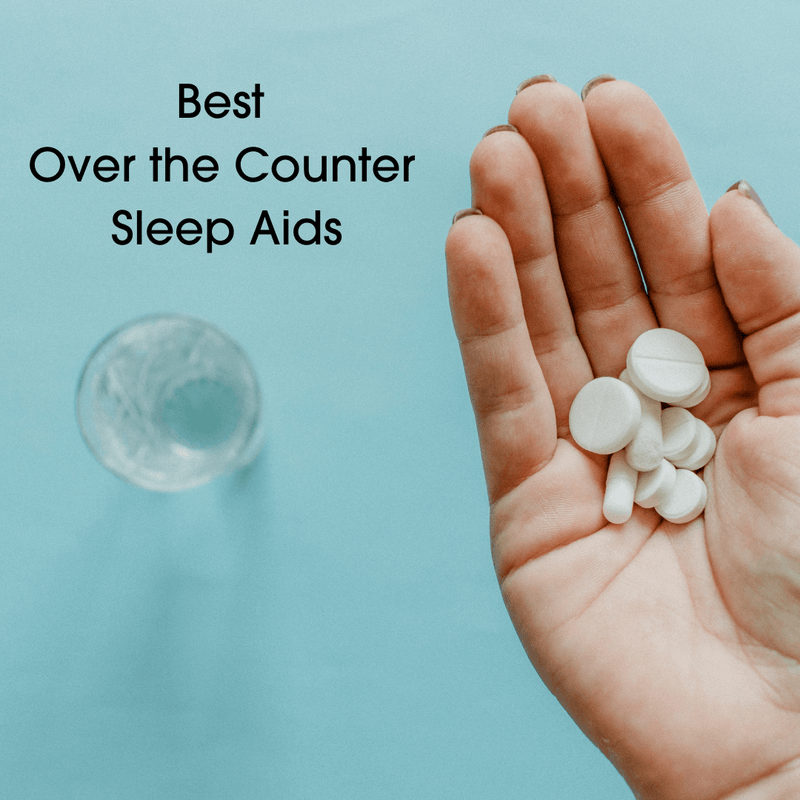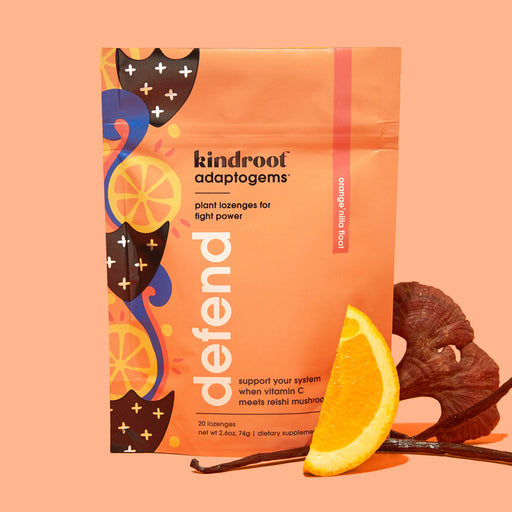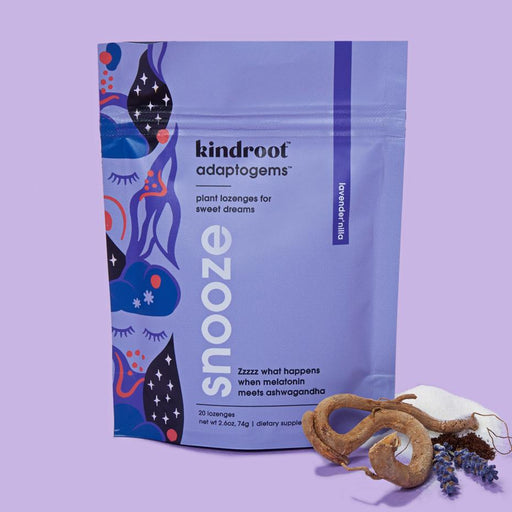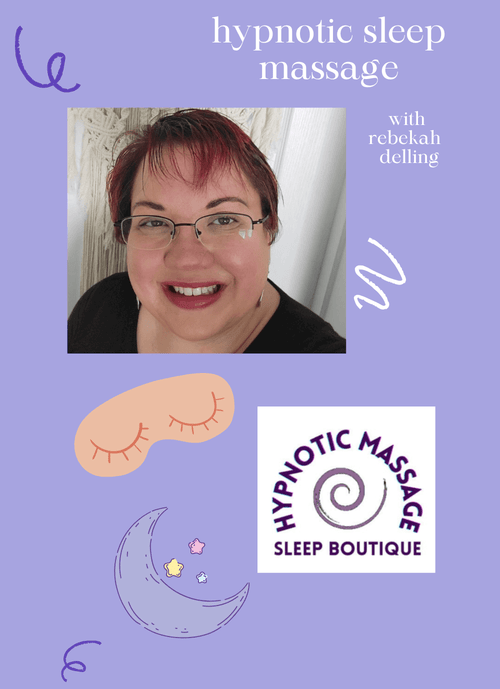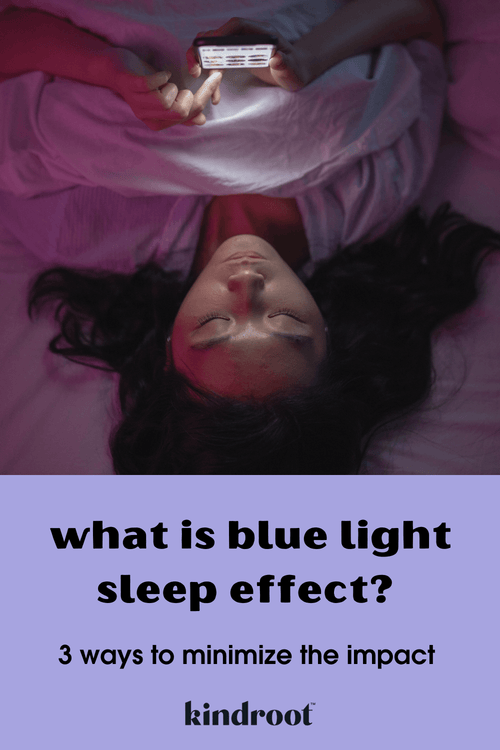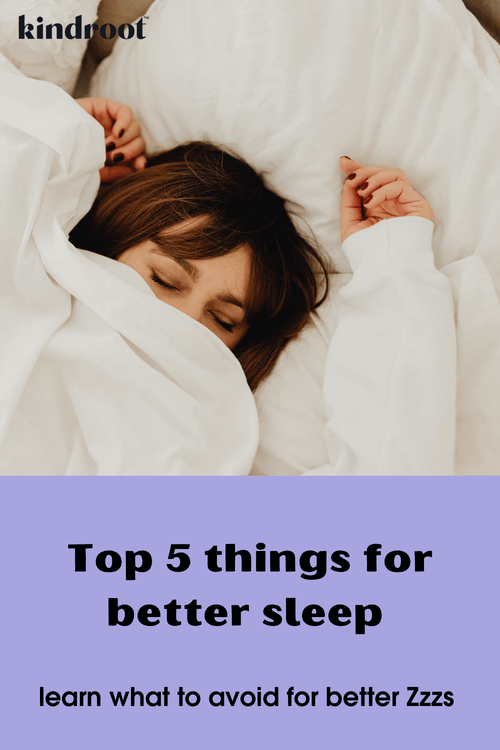Studies show that 30% to 40% of adults have trouble falling or staying asleep, and 85% of people experience general sleep disturbances. Over the counter sleep aids may be safer, more accessible insomnia treatments than prescriptions that can carry dangerous side effects. However, the sheer volume of OTC sleep aids can seem overwhelming, so we asked doctors to weigh in on some of the most popular options to help you choose the best over the counter sleep aid for your needs.
Discover Kindroot Snooze: Melatonin + Ashwagandha Lozenges for Sleep
Contents
- Quick comparison
- Melatonin
- L-theanine
- Magnesium
- Valerian
- Chamomile
- Saffron
- Diphenhydramine
- Doxylamine
- The problem with antihistamines as sleep aids
- The problem with prescription sleep aids
- How to choose the best over the counter sleep aid for you
Over the counter sleep aids quick comparison
|
Name & Brands |
Type |
How It Works |
Potential Side Effects |
|
Melatonin |
Hormone/Synthetic |
Regulates sleep, mimics the body’s natural response to darkness |
Headache, dizziness, nausea, drowsiness |
|
L-theanine |
Amino Acid |
Anxiolytic that promotes relaxation |
Headache, nausea, diarrhea, loss of appetite |
|
Magnesium |
Mineral |
Regulates sleep, blocks excitatory neurotransmitters |
Nausea, vomiting, diarrhea, abdominal cramping |
|
Valerian |
Plant/Herb |
Sedative that increases GABA levels |
Headache, nausea, unease, heart rate changes, dry mouth, vivid dreams |
|
Chamomile |
Plant/Herb |
Sedative that binds to benzodiazepine and GABA receptors |
Nausea, dizziness, allergic reactions (very rarely causing anaphylaxis) |
|
Saffron |
Plant/Herb |
Activate sleep neurons and modulates GABA, serotonin and dopamine |
Headache, anxiety, nausea, changes in appetite |
|
Diphenhydramine Benadryl, Sominex, Tylenol PM, Unisom SleepGels |
Antihistamine |
Crosses blood-brain barrier to decrease histamine levels, inducing non-REM sleep |
Dizziness, unsteadiness, dry mouth, difficulty concentrating, allergic reactions, memory issues, anxiety, dependency and withdrawal |
|
Doxylamine Unisom Sleep Tabs, NyQuil |
Antihistamine |
Crosses blood-brain barrier to decrease histamine levels, inducing non-REM sleep |
Dry mouth, drowsiness, nausea, headache, excitement, constipation, nervousness, allergic reaction, dependency and withdrawal |
Melatonin
Melatonin is naturally produced by the pineal gland and regulates the sleep-wake cycle: when it’s light, your body releases less melatonin, signaling it’s time to be awake. When it’s dark, your body releases more melatonin, signaling it’s time to sleep.
Read: How melatonin boosts immunity, according to experts
“Taking a melatonin supplement affects a person’s circadian rhythm, helping them fall asleep faster and get their biological clock back on track,” says Dr. Po-Chang Hsu, medical content expert at Sleeping Ocean.

Unlike other OTC sleep aids, melatonin supplements mimic the body’s natural response to darkness. It’s a hormone, not a medicine – and not an antihistamine, which can have undesirable side effects. Melatonin is sometimes paired with other ingredients, such as ashwagandha, which can help you relax and stay asleep.
Learn more in our guide to melatonin, including uses, side effects, safety & FAQs
“Melatonin is quite effective for some and it is often used to help correct sleep cycles that are interrupted due to shift work or jet lag. It has a good safety profile and can be taken long-term,” says Dr. Sydney Baker, a naturopathic doctor at Oasis Hormone Therapy and Wellness Center in San Diego. “Melatonin is naturally produced by the brain after the sun sets in order to prepare the body and mind for sleep. Although OTC melatonin is synthesized in a lab, it still gives consumers the notion that it is ‘natural.’”

Kindroot Snooze: Lozenges for Sweet Dreams
Melatonin is a dietary supplement that comes in many different forms and flavors – lozenges, gummies, pills, sprays and drops – so you can find one that suits your taste and preferred delivery method. It’s one of the strongest over the counter sleep aids.
Further Reading: The best melatonin supplements, according to doctors
“Melatonin is generally safe, widely available, and easy to use. Additionally, melatonin works relatively fast and often has more noticeable effects than some alternatives, for example, chamomile or valerian,” says Dr. Hsu. “That being said, melatonin might not work for everyone.”
Melatonin boasts other benefits, too, including immune support, anxiety relief and improved cognitive function.
In-Depth: Does melatonin help with anxiety? See what doctors say
Side effects
A small number of people may experience side effects such as:
- Headache
- Dizziness
- Nausea
- Drowsiness
Recommended dosage
For sleep, the recommended melatonin dosage is 2 to 3mg taken one to three hours before bed. For jet lag, take 2 to 3mg of melatonin two to three hours before you want to sleep.
Learn more about taking melatonin for jet lag
L-theanine
L-theanine is found in tea leaves and may relax the central nervous system and affect neurotransmitters in the brain. It’s not a sedative but an anxiolytic that promotes relaxation.
10 L-theanine benefits, according to science

“L-theanine is a calming amino acid that supports a relaxed state in the body,” says Dr. Baker.
The brain produces glutamate, which makes us feel alert, but L-theanine blocks glutamate from binding to brain cells. L-theanine may also increase dopamine, serotonin and GABA levels while decreasing norepinephrine, promoting positivity and reducing anxiety.

Discover Kindroot Mood, lozenges with L-theanine and reishi mushroom for even-keeled feels
Side effects
Like melatonin, L-theanine is generally regarded as safe, with the potential for minor side effects such as:
- Headaches
- Nausea
- Diarrhea
- Loss of appetite
Extremely high doses – far greater than any doctor would recommend – could cause liver issues.
Recommended dosage
Sleep experts recommend taking 200mg of L-theanine before bed.
Magnesium
Magnesium may help you fall asleep and stay asleep. Researchers studied the effect of magnesium supplements on older adults with insomnia. In a double-blind, placebo-controlled clinical trial, participants who took magnesium reported falling asleep faster, staying asleep longer and improved Insomnia Severity Index (ISI) scores. The study authors also found greater concentrations of melatonin, serum renin and serum cortisol in those who took magnesium.

“Magnesium is a naturally occurring mineral that works by blocking excitatory neurotransmitters, thus preventing over-stimulation,” says Dr. Baker.
Free Sleep Tracker: Track your sleep patterns & how they influence your day
Magnesium triggers the brain to release NMDA and GABA, which may help regulate sleep, and increases the amount of natural melatonin circulating in the body. In addition, magnesium deficiency may disrupt nerve signals and reduce melatonin levels, leading to sleep issues.
Side effects
Magnesium side effects include:
- Nausea
- Vomiting
- Diarrhea
- Abdominal cramping
Recommended dosage
The recommended magnesium dosage is up to 350mg.
Valerian
Studies have shown that this herb may improve sleep quality. In fact, a systematic review of multiple studies reports that people who take valerian have an 80% greater chance of improved sleep versus those who took a placebo, although the review also found potential publication bias.

Valerian is a mild sedative that may work by increasing GABA, which can reduce anxiety and promote drowsiness, and by releasing valerenic acid and iridoids, which have sedating effects.
“Valerian, chamomile and saffron are plants or herbs with different mechanisms of action that promote sleep and nervous system relaxation,” says Dr. Baker.
20 reishi mushroom benefits, backed by science
Side effects
Potential side effects include:
- Headache
- Nausea
- Unease
- Heart rate changes
- Dry mouth
- Vivid dreams
Recommended dosage
The recommended valerian dose is 300 to 600mg.
Chamomile
A flowering plant, chamomile acts as a mild tranquilizer and sleep inducer. It works by binding to benzodiazepine and GABA receptors in the brain, causing a sedative effect that helps you get to sleep.

Some studies have shown that chamomile can significantly improve sleep quality, while others haven’t been able to conclude that chamomile helps with sleep – though one found that chamomile reduced sleep latency by an average of 16 minutes.
Side effects
Chamomile side effects include:
- Nausea
- Dizziness
- Allergic reactions (very rarely causing anaphylaxis)
Recommended dosage
Recommended chamomile dosage is 900 to 1200mg.
Saffron
Saffron is a spice derived from the crocus sativus flower, also called the saffron crocus. One study found that saffron didn’t eliminate insomnia, but it did improve ISI score and increase sleep quality after participants took it for seven days. Another study suggests that saffron improves sleep quality in adults but concludes that more studies are needed.
Saffron may work by activating neurons that promote sleep and inhibiting those that promote wakefulness. It might also modulate GABA, serotonin and dopamine, affecting mood, anxiety and relaxation.
Side effects
- Headache
- Anxiety
- Nausea
- Changes in appetite
Recommended dosage
Recommended saffron dosages range from 20 to 100mg per day.
Diphenhydramine (Benadryl, Sominex, Tylenol PM, Unisom SleepGels)
Diphenhydramine is an antihistamine used to combat allergies. The drug has a sedating effect, so it’s often used in over the counter sleep aids such as Tylenol PM and Unisom SleepGels.

Like other antihistamines, diphenhydramine works by crossing the blood-brain barrier to decrease histamine levels, which in turn induces non-REM sleep.
Unisom VS. Melatonin: Which is best for sleep?
Unlike melatonin and some other OTC sleep aids, it’s possible to develop dependencies to diphenhydramine. You can build a tolerance, and the drug can stop working, so taking it for more than two weeks is not recommended. Some people may be allergic to diphenhydramine, and others, such as those with glaucoma or high blood pressure, shouldn’t take it without consulting a doctor first.
Side effects
Diphenhydramine side effects include:
- Dizziness
- Unsteadiness
- Dry mouth
- Difficulty concentrating
- Allergic reactions
- Memory issues
- Anxiety
- Dependency and withdrawal
“Long-term side effects of extended antihistamine use include memory problems, dementia, anxiety and withdrawal symptoms if the medication is discontinued,” says Dr. Baker.
Recommended dosage
The recommended dosage is 25 to 50mg, taken 20 minutes before bed.
Doxylamine (Unisom Sleep Tabs, NyQuil)
Doxylamine is another antihistamine that works the say way as diphenhydramine.
“Diphenhydramine and doxylamine are synthetic, or lab-made, over the counter antihistamines usually used to relieve the symptoms of allergies,” says Dr. Baker. “While they do tend to help allergies and hay fever, they also cross the blood-brain barrier and can depress the central nervous system, too, thus promoting drowsiness and sleep.”

Side effects
Side effects include:
- Dry mouth
- Drowsiness
- Nausea
- Headache
- Excitement
- Constipation
- Blurred vision
- Nervousness
- Allergic reaction
- Dependency and withdrawal
Recommended dosage
The recommended dosage is 25mg 30 minutes before bed.
The problem with antihistamines as sleep aids
Though many people use antihistamines such as Benadryl and Sominex as sleep aids, a large-scale review of randomized controlled studies found that antihistamines lack clinical evidence for efficacy and safety.
Experts say antihistamines may help you fall asleep, but your sleep quality won’t be good. Moreover, antihistamines could make you hyperactive, alter your mental state and cause parasomnias such as sleepwalking that could be dangerous (Baylor College of Medicine).

“People should remember that antihistamines can cause several side effects, including daytime drowsiness, which can be dangerous when driving, operating machinery and taking care of babies,” says Dr. Hsu, who adds that other side effects include dizziness, urine retention, blurred vision and dry mouth.
The problem with prescription sleep aids
Prescription sleep aids such as Ambien (zolpidem), Lunesta (eszopiclone), Restoril (temazepam) and Sonata (zaleplon) work by slowing brain activity.
Potential side effects include:
- Prolonged drowsiness
- Headaches
- Diarrhea
- Nausea
- Dizziness
- Behavioral changes
- Hallucinations
- Memory issues
- Agitation
- Suicidal thoughts
- Severe allergic reactions
- Increased cancer risk
- Increased mortality risk

One study found that patients who were prescribed hypnotics for sleeping had substantially increased risks of early death and cancer. Researchers reported that people who took prescription sleeping pills had more than four times the mortality rate of those who didn’t, and mortality rates increased even for those who took less than 18 doses per year. In addition, people who took high doses were 35% more likely to get cancer within 2.5 years of the study.
As of 2019, the FDA stated that hypnotic drugs were linked to 20 deaths and 46 serious injuries. The regulating agency requires Lunesta, Sonata and Ambien packaging to display black-box warnings that “call attention to serious or serious or life-threatening risks.”
Benzodiazepines such as Valium and Xanax aren’t usually prescribed for sleep anymore because they’re not always effective and can have harmful effects. One study found that they can suppress deep sleep, and risks include addiction, cognitive decline and automobile accidents.
How to choose the best over the counter sleep aid for you
The best OTC sleep aid for your needs depends on various factors, including:
1. Ingredients
Supplements aren’t tightly regulated by the FDA like medicines are, so it’s crucial to purchase sleep aids made by reputable brands that use quality ingredients with consistent dosages.
Read the ingredients list to ensure any sleep aids you take meet your dietary standards – for example, if you eat a vegan diet or prefer organic sources. If you have diabetes, watch out for gummies, chocolates and other candied supplements that could be high in sugar.

Some supplements blend multiple sleep-inducing ingredients, such as melatonin and ashwagandha, that work together to help you get to sleep and stay asleep.
Does melatonin make you smarter? Here's what doctors say
2. Safety
Evaluate the potential side effects of any OTC sleep aid before you take it. Certain people shouldn’t take antihistamines, for example; others may have allergies to common sleep supplements. If you’re unsure, consult your doctor.
“The herbal, amino acid and mineral products are going to be the safest and least disturbing to the body,” says Dr. Baker. “The lab-derived antihistamines are not ideal as your body will build up a tolerance over time, and you may become dependent on higher amounts as time progresses.”
3. Efficacy
Research which types of sleeping aids are proven to work with minimal risk of side effects. For many people, supplements may be just as effective – or even more effective – than many drugs, without all the risks.
“It depends on each person, their health history, lifestyle, and the causes of their sleep issues,” explains Dr. Hsu. “Most people are satisfied with melatonin, noting that this supplement works fast and effectively. However, some people are sensitive to melatonin, causing them to experience daytime grogginess.”

The best melatonin supplements, according to doctors
Dr. Baker recommends trying a sleep aid for three weeks before deciding if it’s helping. She suggests asking these questions to help determine if it’s a good fit for you:
- Are you falling asleep within 20 minutes of lying down?
- Are you staying asleep through the night or waking multiple times?
- Do you wake in the morning feeling well-rested and ready to go, or do you feel groggy?
“Oftentimes, it takes trial and error to see exactly how your body will respond to specific products,” she says. “I would recommend steering clear of the diphenhydramine and doxylamine and opting for something that will not generate dependence if used long term.”
4. Flavor and delivery
Choose an over the counter sleep aid that comes in your preferred flavor and delivery method. For example, some people have trouble swallowing pills and might prefer a tasty lozenge that melts in the mouth. Supplements come in various flavors and forms, including pills, lozenges, gummies, chocolates, sprays and more.

Kindroot Snooze: Lozenges for Sweet Dreams
5. Cost
Cost is another factor to consider, especially if you plan on using sleep aids for more than a few nights. Some supplements have short shelf lives, so make sure to check expiration dates if you only use sleep aids occasionally.
Over the counter sleep aids can help you get to sleep and improve sleep quality, but they’re not created equal. Some are more effective and safer than others. Some are flavorful, while others are simply pills you swallow. Evaluate your options to find the most effective, safest and best OTC sleep aid for your needs.
